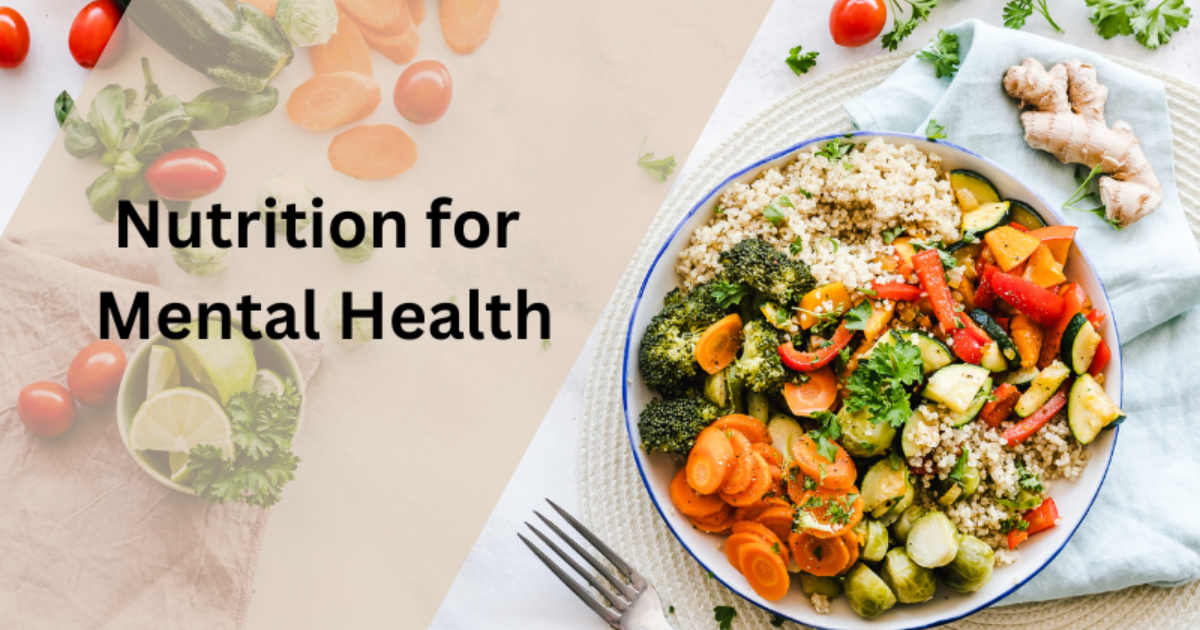
Nourishing Minds: Exploring the Impact of Nutrition for Mental Health
- November 16, 2023
- Nutritional Psychology, Brain-Boosting Foods
- 0 Comments
While we’re accustomed to acknowledging how food affects your body, nutrition for mental health tends to take a backseat. Did you know you can manage stress with your food choices?
This blog spills the bean on the profound nutrition-mental well-being connection. What you will get after reading this is how to cultivate healthy eating habits in your daily life!
Table of Contents
The Science Behind Nutrition-Mental Health Connection
The connection between what you eat and how you feel is tied to the close brain-gut relationship. In your gut, tons of bacteria produce chemicals (e.g. dopamine and serotonin) that send messages to your brain.
Eating healthy foods helps good bacteria grow; you’ll have more of these feel-good chemicals. On the other hand, sugary foods, while giving a quick happiness boost, can also lead to mood crashes.
As a result, choosing nutrient-packed foods instead of unhealthy ones sets you up for better moods and improved focus. Studies even show a clean diet can help with depression and anxiety, while unhealthy eating can lead to dementia and stroke.
So, what you eat can impact how you feel and think! Now, let’s learn more about nutrition for mental health!
Read more: The Secret to Harmonious Relationships.
Nutrition For Mental Health: 8 Key Nutrients In Supporting Cognitive Function
Every nutrient in food plays a role in your physical and mental health. Below are nine vital nutritional groups to focus on for good cognitive function.
Carbohydrates
Your brain loves carbs because they break down into glucose, its primary source of energy. Adequate glucose levels are essential for optimal cognitive function, including memory and attention.
Where to find this nutrition for mental health? Opt for whole grains, fruits, and veggies. They provide complex carbohydrates that release glucose gradually. It’s like a slow burn instead of a quick sugar rush. This helps keep your mood stable and prevents those crazy mood swings.
Read more: Creating Harmony Within How to Find Your Balance and Thrive.
Protein

Besides building muscles, protein helps in producing neurotransmitters, the brain’s messengers. Amino acids are the proteins’ building blocks. They play a role in synthesizing these neurotransmitters (e.g. serotonin and dopamine) influencing mood and cognition.
Foods rich in protein (eggs, lean meats, fish, and legumes) provide the necessary components for neurotransmitter production. What happens next? They contribute to a balanced mental state.
Fiber
Foods high in fiber, like whole grains, fruits, and veggies, keep your gut happy. And guess what? A happy gut means a happy brain!
Moreover, stable blood sugar levels from a fiber-rich diet help keep your mood steady. So, when you’re loading up on fiber, you’re not just doing your tummy a favor; you’re giving your brain a high-five, too.
Antioxidants
Do you know antioxidants can support your mental well-being? Found in fruits, veggies, and nuts, they combat oxidative stress, protecting your brain from damage. This stress can mess with your mood and cognitive function.
Antioxidants, like vitamins C and E, swoop in to neutralize free radicals and keep things in check. Including these superhero nutrients in your diet helps maintain a healthy brain, supporting your mental resilience and overall well-being.
So, snack on those berries and veggies for a mental health boost!
Vitamin D
Vitamin D is often dubbed the sunshine vitamin. It’s vital for bone health and influences neurotransmitters like serotonin, which are key players in regulating mood.
Sunlight exposure triggers vitamin D synthesis in the skin and dietary sources such as fatty fish and mushrooms. They contribute to its intake.
Research suggests a correlation between low vitamin D levels and conditions like depression and seasonal affective disorder (SAD).
So, ensuring adequate vitamin D intake through sunlight, diet, or supplements positively impacts mental clarity. In the end, this promotes resilience against mood disorders.
B Vitamins
B vitamins can support mental health by contributing to various biochemical processes in the brain. To help you understand this, here’s a breakdown of vital B vitamins and their contributions (along with food sources):
| B Vitamin | Contribution to Mental Health | Food Sources |
| B6 | Synthesis of neurotransmitters (serotonin, dopamine) | Chicken, turkey, bananas, potatoes |
| B9 (Folate) | DNA and neurotransmitter production, mood regulation | Leafy greens, legumes, fortified grains |
| B12 | Nerve function, red blood cell production, overall brain health | Meat, fish, eggs, dairy, fortified foods |
These vitamins work together to maintain cognitive function, stabilize mood, and prevent mental health issues. So, including B vitamin-rich foods in your diet is like giving your brain a daily dose of vitality.
Magnesium, Iron, Zinc
Magnesium, iron, and zinc form a powerhouse trio in supporting mental health:
- Magnesium (abundant in nuts, seeds, and leafy greens) plays a crucial role in synaptic transmission, contributing to overall brain function.
- Iron (in lean meats, legumes, and fortified cereals) ensures optimal oxygen transport to the brain for cognitive processes.
- Zinc (in dairy, meat, and nuts) regulates neurotransmitters. They support memory and mood.
If your body lacks these minerals, your mental health will have issues, including anxiety and depression. So, don’t forget these in your meals!
Fermented Foods
Fermented foods (yogurt, kimchi, sauerkraut, and kefir) go beyond satisfying taste buds! These foods are rich in probiotics, which help maintain a gut bacteria’s healthy balance. Probiotics influence the production of neurotransmitters like serotonin (closely linked to mood regulation).
Including these treats in your diet may foster a happier gut and, consequently, a more resilient and balanced mental state.
Tips for Healthy Eating Habits To Provide Nutrition For Mental Health

You need a healthy and scientific diet to effectively consume the nutrients discussed above. Here are some tips for this:
- Eat a mix of foods with different colors: Have a variety of fruits, veggies, whole grains, proteins, and food with omega-3 fatty acids (salmon, nuts, and seeds)
- Drink water: Staying hydrated is vital. Note: Even a little dehydration can affect your mood and focus.
- Watch junk food: Try to eat less sugary and salty snacks.
- Limit coffee and alcohol: Too much coffee or alcohol can mess with your sleep and how you feel.
- Eat regular meals: Having regular, balanced meals instead of a lot of food at one meal helps keep your energy levels steady.
- Mindful eating: Pay attention to when you’re hungry and full to prevent overeating and promote a healthy relationship with food.
By following this healthy lifestyle, you’re not just helping your body. You’re also giving your brain the right stuff to feel good and think positively.
Conclusion
You’ve learned about nutrition for mental health and tips to have healthy eating habits. It becomes evident that what we consume plays a role in shaping our cognitive function and emotional balance.
With this knowledge, let’s embrace a holistic approach to nourishing body and mind! If you don’t know how to start, let’s Mentalmapguide help you!






